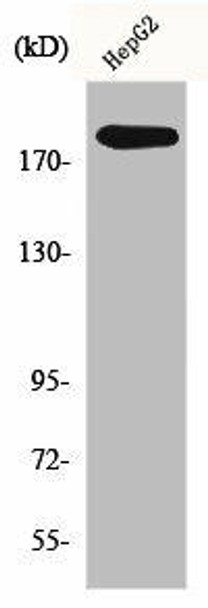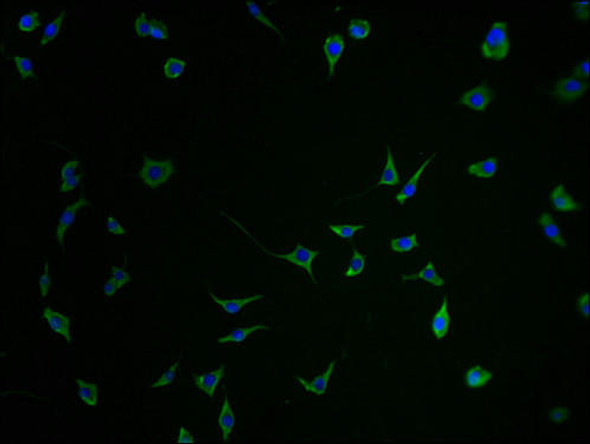POLA1 Antibody (PACO00714)
- SKU:
- PACO00714
- Product Type:
- Antibody
- Reactivity:
- Human
- Host Species:
- Rabbit
- Isotype:
- IgG
- Applications:
- ELISA
- WB
- Antibody Type:
- Polyclonal Antibody
- Conjugation:
- Unconjugated
Description
POLA1 Antibody (PACO00714)
The POLA1 Polyclonal Antibody (PACO0714) is a valuable research tool for scientists investigating the POLA1 protein, which is essential for DNA replication and repair. This antibody, produced in rabbits, is highly specific to human samples and has been validated for use in Western blot applications. By targeting the POLA1 protein, this antibody enables the detection and analysis of POLA1 in various cell types, making it ideal for studies in molecular biology and cancer research.The POLA1 protein plays a crucial role in maintaining genomic stability and fidelity during DNA replication. Dysregulation of POLA1 has been linked to genomic instability and cancer development, highlighting its importance in understanding the molecular mechanisms underlying tumorigenesis.
By studying the function and regulation of POLA1, researchers can gain insights into potential therapeutic targets for cancer treatment and prevention.Overall, the PACO0714 Polyclonal Antibody is a valuable tool for researchers interested in studying the role of POLA1 in DNA replication and its implications for cancer biology. Its high specificity and reliability make it a trusted reagent for Western blot analysis, allowing for accurate and reproducible results in a variety of experimental settings.
| Antibody Name: | POLA1 Antibody |
| Antibody SKU: | PACO00714 |
| Size: | 50ug |
| Host Species: | Rabbit |
| Tested Applications: | ELISA, WB |
| Recommended Dilutions: | WB:1:500-1:2000 |
| Species Reactivity: | Human |
| Immunogen: | synthesized peptide derived from the N-terminal region of human DNA pol alpha. |
| Form: | Liquid |
| Storage Buffer: | Liquid in PBS containing 50% glycerol, 0.5% BSA and 0.02% sodium azide. |
| Purification Method: | The antibody was affinity-purified from rabbit antiserum by affinity-chromatography using epitope-specific immunogen. |
| Clonality: | Polyclonal |
| Isotype: | IgG |
| Conjugate: | Non-conjugated |
| Synonyms: | POLA1; POLA; DNA polymerase alpha catalytic subunit; DNA polymerase alpha catalytic subunit p180 |
| UniProt Protein Function: | POLA: Plays an essential role in the initiation of DNA replication. During the S phase of the cell cycle, the DNA polymerase alpha complex (composed of a catalytic subunit POLA1/p180, a regulatory subunit POLA2/p70 and two primase subunits PRIM1/p49 and PRIM2/p58) is recruited to DNA at the replicative forks via direct interactions with MCM10 and WDHD1. The primase subunit of the polymerase alpha complex initiates DNA synthesis by oligomerising short RNA primers on both leading and lagging strands. These primers are initially extended by the polymerase alpha catalytic subunit and subsequently transferred to polymerase delta and polymerase epsilon for processive synthesis on the lagging and leading strand, respectively. The reason this transfer occurs is because the polymerase alpha has limited processivity and lacks intrinsic 3' exonuclease activity for proofreading error, and therefore is not well suited for replicating long complexes. Belongs to the DNA polymerase type-B family. |
| UniProt Protein Details: | Protein type:DNA replication; DNA repair, damage; Nuclear envelope; EC 2.7.7.7; Nucleotide Metabolism - purine; Transferase; Nucleotide Metabolism - pyrimidine Chromosomal Location of Human Ortholog: Xp22.1-p21.3 Cellular Component: nucleoplasm; alpha DNA polymerase:primase complex; nuclear matrix; cytoplasm; nucleolus; nuclear envelope; chromatin; nucleus Molecular Function:protein binding; DNA binding; DNA primase activity; protein heterodimerization activity; 4 iron, 4 sulfur cluster binding; metal ion binding; nucleoside binding; nucleotide binding; DNA-directed DNA polymerase activity; chromatin binding; protein kinase binding Biological Process: DNA replication initiation; viral reproduction; DNA replication, synthesis of RNA primer; DNA strand elongation during DNA replication; leading strand elongation; DNA repair; lagging strand elongation; double-strand break repair via nonhomologous end joining; telomere maintenance via semi-conservative replication; G1/S-specific transcription in mitotic cell cycle; DNA synthesis during DNA repair; cell proliferation; telomere maintenance via recombination; mitotic cell cycle; DNA replication; telomere maintenance; G1/S transition of mitotic cell cycle Disease: N Syndrome |
| NCBI Summary: | This gene encodes the catalytic subunit of DNA polymerase, which together with a regulatory and two primase subunits, forms the DNA polymerase alpha complex. The catalytic subunit plays an essential role in the initiation of DNA replication. [provided by RefSeq, Mar 2010] |
| UniProt Code: | P09884 |
| NCBI GenInfo Identifier: | 106507301 |
| NCBI Gene ID: | 5422 |
| NCBI Accession: | NP_058633 |
| UniProt Secondary Accession: | P09884,Q86UQ7, |
| UniProt Related Accession: | P09884 |
| Molecular Weight: | 165,913 Da |
| NCBI Full Name: | DNA polymerase alpha catalytic subunit isoform 2 |
| NCBI Synonym Full Names: | DNA polymerase alpha 1, catalytic subunit |
| NCBI Official Symbol: | POLA1 |
| NCBI Official Synonym Symbols: | NSX; POLA; p180 |
| NCBI Protein Information: | DNA polymerase alpha catalytic subunit |
| UniProt Protein Name: | DNA polymerase alpha catalytic subunit |
| UniProt Synonym Protein Names: | DNA polymerase alpha catalytic subunit p180 |
| Protein Family: | Polar flagellin |
| UniProt Gene Name: | POLA1 |
| UniProt Entry Name: | DPOLA_HUMAN |










